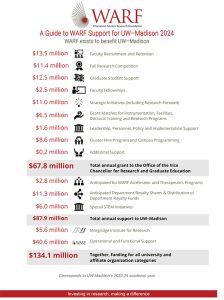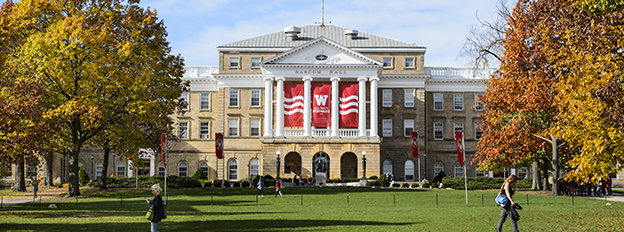Base grant, supplemental grants and operational and functional support total $134.1 million
CONTACT:
Jeanan Yasiri Moe
Director of Strategic Communications and Public Affairs
[email protected] | (608) 960-9892
MADISON, Wis. – The Wisconsin Alumni Research Foundation (WARF) today announced $134.1 million in total annual support to the University of Wisconsin-Madison research community. The overall amount extends across all grant categories and research programs for the academic year ending in 2024.
At the end of each fiscal year, the WARF Board of Trustees approves total grant funding for the following fiscal year in response to a formal request from UW-Madison’s Office of Research and Graduate Education (OVCRGE).

The core annual grant this year makes $67.8 million available to the OVCRGE for ongoing research programs. Additional supplemental grants for 2024 provide targeted, timely contributions to research-related initiatives. Together, the annual grant and supplemental grants bring direct financial support to UW-Madison to $87.9 million. Finally, WARF’s operational and functional support to UW-Madison, valued at $40.6 million, and a grant of $5.6 million to the university-affiliated Morgridge Institute for Research round out the $134.1 million total.
“WARF’s mission is to support the research enterprise of the University of Wisconsin-Madison and the Morgridge Institute for Research,” says Erik Iverson, CEO of WARF. “Our annual grant to these organizations is part of that support and something our entire staff celebrates each year. This support advances outstanding research that positively impacts our world.”
“The WARF Board of Trustees are the current custodians of the yearly grant to UW-Madison. We keep research excellence foremost in our minds as we determine our annual support,” says Dr. James Berbee, chair of the WARF Board of Trustees. “With the university celebrating its 175th anniversary this year, we’re reminded that the impact on the people of Wisconsin—and the world—must be measured not in our lifetimes, but in centuries.”
The broad range of research-related programs covered by WARF’s annual grant includes $13.5 million for faculty recruitment and retention, $2.5 million for faculty fellowships and $12.5 million for graduate student support.
The Fall Research Competition, which draws hundreds of research proposals from as many as 120 academic departments each year, will receive $11.4 million from WARF. Another $11 million has been allocated to Research Forward and similar strategic initiatives to advance transformative projects on campus.
Grant matches for instrumentation, facilities, doctoral training and research programs total $6.5 million, and $1.6 million covers leadership, personnel, policy and implementation support. $8.6 million is committed to continuing support for the university’s previously awarded Cluster Hiring Initiative and several other targeted research programs. Additional support of $0.2 million completes the $67.8 million annual grant.
“WARF’s investment provides our university the flexibility to nurture exciting new ideas and priorities across campus,” Chancellor Jennifer Mnookin says. “This support helps UW-Madison maintain our world-class faculty and provide students unique opportunities to learn and grow into Wisconsin’s next generation of leaders and innovators.”
Supplemental grants, above and beyond the usual annual grant, this year include $6.0 million for special STEM initiatives, specifically selected by the OVCRGE to receive WARF funding. The $2.8 million allocated to the WARF Accelerator and WARF Therapeutics programs also provides financial support to campus, as does an anticipated distribution of $11.3 million to university departments as their shares in the royalties derived from the commercialization of WARF technologies.
“WARF’s annual gift is instrumental for advancing UW-Madison’s research enterprise and keeps our institution at the forefront of research discovery and innovation. The support we receive from WARF provides funding to support transformative multi-disciplinary research, grant matches for cutting-edge instrumentation, fellowships for graduate student training, and funding to increase our abilities to competitively recruit new faculty who are rising stars in their fields, and to retain our world-class faculty,” says Cynthia Czajkowski, interim vice chancellor for research and graduate education. “I’m especially excited by our partnerships with WARF in supporting funding initiatives in emerging research areas that address societal problems.”
WARF’s $5.6 million in annual support for the Morgridge Institute for Research recognizes the private, nonprofit institute’s ongoing mission to improve human health through innovative, interdisciplinary biomedical discoveries. Like WARF, the Morgridge Institute is a supporting organization affiliated with UW-Madison.
“WARF’s ongoing support of the Morgridge Institute has been an essential ingredient in our efforts to answer fundamental questions in human biology—answers that could greatly benefit health and well-being,” says Brad Schwartz, CEO of Morgridge. “WARF support also enables us to be a catalyst with UW-Madison to support important new directions in biomedical research.”
WARF’s 2024 total annual support continues a tradition of investing in UW-Madison that dates back almost a century. While most universities bear the cost of technology commercialization and asset management through their own budget, the foundation has provided mission-driven operational and functional support to UW-Madison equivalent to $40.6 million this year and $439 million over the last 15 years. This unique model has stood alone in U.S. higher education since 1925.
About WARF
Incorporated as a nonprofit foundation in 1925, WARF has a founding purpose “to promote, encourage, and aid scientific investigation and research at and within the University of Wisconsin-Madison.” Over 98 years the foundation has funded more than $4.4 billion in cumulative research grants to UW-Madison and the Morgridge Institute for Research (adjusted for inflation), has been issued more than 4,200 patents (with 2,200 active patents), generates an additional 375 invention disclosures and 55 revenue-generating licenses each year, and has helped create 190 startup companies based on UW-Madison technologies. For more information, visit warf.org and watch a video about how WARF stewards the Cycle of Innovation.
###
